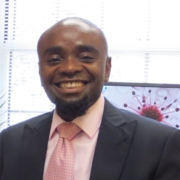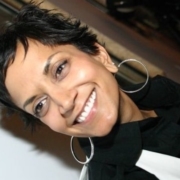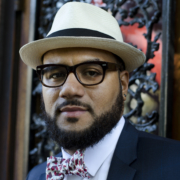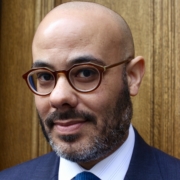Francine Menashy and Zeena Zakharia
White Ignorance in Global Education
Today we focus on a hugely important issue but one that is generally absent within the organizations and structures that make up the global education architecture. The issue is race. My guests today, Francine Menashy and Zeena Zakharia, have spent years speaking with staff members at various global education organizations – you know, places like UNESCO, UNCIEF, the World Bank, and the Gates Foundation. They also scrutinized hundreds of publications these organizations have published. Francine and Zeena come to the conclusion that few if any of these organization deal with race and racial power relations between the global north and south in any meaningful way.
Francine Menashy is an associate professor at the University of Toronto and Zeena Zakharia is an assistant professor at the university of Maryland, College Park. Their new article in Harvard Educational Review is entitled White Ignorance in Global Education. It’s open access until March 9
Citation: Menashy, Francine, Zakharia, Zeena interview with Will Brehm, FreshEd, 308, podcast audio, February 13, 2023. https://freshedpodcast.com/menashy-zakharia/
Will Brehm 1:25
Francine Menashy and Zeena Zakharia, welcome to FreshEd.
Zeena Zakharia 3:08
Thanks for having us.
Francine Menashy 3:09
Thank you, Will.
Will Brehm 3:10
So, Zeena, I’m gonna ask you a little bit about the aftermath of the murder of George Floyd in May of 2020. And the international attention that it garnered through the Black Lives Matter movement and sort of spread globally. How did global education organizations respond to that moment?
Zeena Zakharia 3:29
Well, there was a swell in solidarity statements in support of Black Lives Matter put out by all sorts of organizations involved in global education. And not just statements, but also blogs and other response pieces. And we were in the process of studying partnerships in global education, including many of the organizations who are making these statements. So, we began to document the statements and analyze them. For example, we searched 40 websites of organizations involved in global education and found that 25 had released public statements in the summer or fall of 2020 that articulated solidarity, as in the need to stand together, with Black Lives Matter. This, of course, was significant but in further analyzing the statements and the websites, we found, the statements to be largely superficial and reactionary with limited action attached to them. For example, just 11 explicitly acknowledged that they needed to do more to address racism in the sector, and only seven named structural racism or coloniality. Our interviews corroborated the superficial nature of this response. We talked to 55 people working in global education organizations, and when we asked them about concrete actions taken in response to Black Lives Matter, they mainly refer to internal practices. You know, like racism, awareness, discussions, watching webinars on anti-racism and the like. While these activities are new and important as part of anti-racist efforts in general, we found that they only targeted the individual and interpersonal level rather than structural factors. In fact, very few people we talked to could identify any structural changes proposed to address racism in the sector. Some of them noted that the response was extremely disappointing to them. That it was more focused on external communications and really just surface stuff.
Will Brehm 5:20
It’s quite interesting to think about all of these statements in solidarity, but very little action, right? It’s a lot of words and no action in some ways. So, Francine, I mean, does that inaction say anything about there being some type of structural racism within this global architecture of education? You know, all these diverse organizations that you’re finding a sort of similar pattern in their response to Black Lives Matter movement?
Francine Menashy 5:48
Yeah, and I think certainly, in our assessment, this is evidence of structural racism. And actually, there have been long running critiques of structural racism in international development, not just education, and coming often from Global South activists and Black women in particular. And scholars have also traced racism within the development and humanitarian sectors too. These critiques started to just gain a lot of traction in more mainstream circles in the summer of 2020. So, for example, these critics have pointed out how racism often emerges in the professional roles that people take. There’s a distinction between those who provide aid and assistance and those who receive this support. The professional structure is really a division that aligns with racial categories, and international development processes and policies often reflect assumptions around white superiority, often privilege the knowledge of white actors of white people. So, for instance, just simply stated, the terms capacity building, technical expertise, these often reinforce the superiority of those in the Global North who are predominantly white. And these assumptions then devalue the knowledge and the capabilities of those in the Global South, or those who receive international aid, predominantly non-white people. And so, our findings reinforced all of this. We heard many times from respondents from all different types of organizations that these racial divisions characterize the global education development and humanitarian sectors. So, education organizations say that they’re with Black lives and then they don’t follow up with meaningful action to address these hierarchies. They’re not addressing – and in fact, maintaining – structural racism in the sector.
Will Brehm 7:51
In your work, were you able to see how these different organizations sort of in the Global North, for instance, even began to understand race and racism as a structural issue? I mean, I guess, in the sense of, Black Lives Matter sort of originated in the US, but it went global. So, in a sense, is race and racism seen as sort of a uniquely American issue? Or is this also something that’s recognized as being a global phenomenon that these organizations then have to sort of deal with and manage and potentially react to and stop maybe?
Zeena Zakharia 8:28
Well, organizations have been forced to reckon with racism, in some ways, because of public pressure all over the world. And increased discussions of race, decolonization and so on in the sector. But what we found was that these conversations predominantly occurred within those organizations headquartered in the United States. Overall, those representing educational organizations based outside of the US portrayed racism as a distinctly US problem. For example, saying that racism was an issue within the US perspective, you know, very American, and related to the Black American experience. In this way, they denied white supremacy and structural racism as global problems.
Will Brehm 9:12
Yeah. And sort of denied the global movement of Black Lives Matter, right? It did spread to all of these other countries. I mean, in the UK, they had big protests that Black Lives Matter were happening. So, in a way is this sort of erasing race from sort of global education policy, the global education architecture, as we’ve been calling it?
Zeena Zakharia 9:33
Well, yeah. You can see that overall, there’s a preference for race neutral language and a color-blind approach in global education spaces. Without ascribing the term race to categories that derived from historically racialized groupings. We see this erasure as manifesting through the adoption of euphemisms, like ethnicity and culture, to sanitize issues that include racism. In our study, for example, rhetoric that identified inequities between, say rich donor countries and countries that receive educational financing, discuss the need for things like recipient ownership, or localization, or community participation. And organizations commonly made broad references to discrimination and marginalization when describing educational issues, but language that’s specified race or racism were notably rare. We actually did a systematic review of 227 documents published between 2011 and 2020, by Northern based organizations like strategic plans, annual reports, and so on. And none discuss the racial lines between funders and recipients, fewer than 14% mentioned race at all.
Will Brehm 10:48
It blows my mind when I hear those numbers. It’s shocking but maybe I shouldn’t be shocked as well. And that’s what I’m sort of struggling with here.
Zeena Zakharia 10:55
Only two documents of the 227 that we looked at included a substantive discussion of race and racism in education citing interpersonal and institutional racism, both were published by UNESCO. So, this silencing and sanitizing might be understood as a racial erasure, right, or a retrospective whiting out or white washing of issues that include racism. And our interviews corroborated this as well. They noted the silencing. Some, for example, they said inequities in the sector fall along racial lines, but the subject is essentially silenced. And that issues of race, one person said they’re nowhere on the agenda. And one of the leaders of an international organization explained that in policy development, discussions on race are considered controversial. And many organizations are wary of using terminology that might seem offensive. So, with Black Lives Matter, many organizations were concerned about the politicized nature of the movement. And so, there was the silencing of conversations there as well. And the people we talked to also describe pushback on anti-racism conversations within organizations because of individuals’ discomfort. Erasure occurs in these circumstances too because white supremacy and racism are sidelined to address the needs of white people. This inclination to silence discussions on race, deeming the subject politicized, controversial, or taboo, or even a tendency to divert conversations on race to address the concerns of white people reflect racial erasure and an effort on the part of actors within the global education architecture to construct an alternative narrative separated from current and past racism.
It’s really quite sort of shocking how these different organizations can create their self-interested logics that do erase certain languages and certain experiences for their own sort of survival. They don’t want to step into too much sort of politically fraught areas, whatever that is, but they still want to be seen as responding to whatever the zeitgeist is. It’s rather depressing when you really think about it, because these are also the organizations saying they want to use education to make change. And if they’re simply not addressing things like race, and structural racism, then what on earth are they doing? And you use this term in the article called “global white ignorance” and I really loved this idea, because I think you start seeing white ignorance across the globe, and particularly in some of these institutions operating cross nationally. In your mind, how does this term help us understand the way that a race has been erased and sort of downplayed inside these big educational organizations?
Francine Menashy 13:42
I’m going to start by just explaining this term, white ignorance, which was introduced by the philosopher Charles Mills. I think probably a lot of listeners will know his name. He wrote a very famous book called The Racial Contract and, in that book, he discusses what he calls an epistemology of ignorance. And he explains that that’s a capacity to ignore the truth. So, when it comes to racism, Mills says that white people often have this ignorance, which is really a privilege to ignore racism. It’s essentially a form of self-deception. And he calls it white ignorance, and it’s enabled by white racial privilege. And this ignorance allows the reproduction of structural racism in which white people are fully able to benefit from racial hierarchies precisely because they can, if they choose to, simply ignore the racist world that we live in. And another important aspect of this concept of white ignorance that Mills discussed is that it hinges on what he calls a general skepticism about the capacities, the intelligence, the credibility of non-white people. So, this assumption makes racial hierarchies seem natural. And so, you don’t even really need to think about it. It’s just there, it’s just natural. Now, most of Mills’ work was in the US context, it was in the American context. But in his later work, he wrote a follow up piece on global white ignorance, where he spoke of how white ignorance extends across the world. And he discussed its connections to colonial legacies. And so, we applied this concept of global white ignorance to help understand our findings. in particular, as we’ve discussed, this erasure of race from global education policies and mandates and how organizations have sanitized their language to not even mention race. And so, we used it to examine really the power hierarchies that we see in the global education environment.
Will Brehm 15:57
So, this global white ignorance is operating in more institutions than you necessarily looked at, right? I mean, what you’re sort of suggesting, or what Mills would be suggesting is that this global white ignorance would be operating across the field of international development and education in comparative education. I mean, it would be everywhere, in a way.
Francine Menashy 16:20
Oh, yes. So, we read really widely about race in international development and humanitarianism, well beyond the education sector. And then also, in our interviews, we spoke with respondents who had worked in various sectors, not just education. And so, we came to the conclusion that these issues are pervasive. We can’t claim that they’re unique to global education. Beyond educational organizations, the development sector, the humanitarian sector, as well, in general have faced a lot of accusations of upholding racist structures through their long-standing power hierarchies. So, this becomes clear when you look at the whole structure of aid. So, international organizations, they exert power over governments. over actors in the Global South by, you know, in various ways, demanding conditions on loans, dictating priorities, keeping people from the Global South from participating in major decision making. And then you have the fact that the vast majority of global governance organizations are headquartered in the Global North – they’re in DC, New York, Paris – and they employ predominantly Northern born or Northern educated staff at their headquarters. And then as well, employees of global organizations, they frequently travel to aid receiving countries on these short-term assignments just to monitor activities, provide technical advice, or provide capacity building. I put that in air quotes as I spoke. And then meanwhile, local, Global South actors serve mainly as the implementers of the projects that are designed and funded by the global organizations. And then most organizations have established country level offices that commonly employ local staff in more clerical positions with Northern, or what’s commonly termed expatriate workers, at the senior director levels. So, this is a structural dynamic in international aid, which shows clear, long-standing asymmetries, and these hierarchies reflect colonial and racial hierarchies across these entire sectors, not just education. So, this is a huge structural issue. And we posit, global white ignorance helps perpetuate it. So, not only in the education sector, across international development, across international aid.
Will Brehm 18:59
You know, listening to you, and also, since I read your article quite closely, there’s so many connections to Raewyn Connell’s, famous book Southern Theory and how she basically talks about these researchers in Europe and in North America going to different places in the Global South and sort of extracting data and even employing locals to do that data extraction, and then bringing it all back to these universities in the metropole to do the theorizing, and the thinking. And in a way, it’s not necessarily about aid and development but it’s about sort of the academic knowledge creation is actually sort of cut through with these colonial legacies, these legacies of dependency. And I think in a similar way, you’re sort of highlighting this in the aid sector in particular, but focused mostly on race because of course, other authors – I also think of Jamie Martin, who wrote a book recently called The Meddlers and he looked at sort of the economic governance across nations and how they’re sort of these colonial legacies, through aid even, but he doesn’t really talk about race. And so, you bring in this notion of there are sort of racial legacies and a racializing project that’s happening, sort of along these historical lines is, I think, a really nice addition to the conversation. So, I guess, in your ways, how is this global white ignorance and all these racial structures, how are they actually connected to colonialism in your mind?
Zeena Zakharia 20:28
Well, in our paper, we use the term coloniality to capture how racial formations from colonialism have persisted into post-colonial global paradigms and power asymmetries. You know, foundational post-colonial and anti-colonial scholars have described how racism shaped colonial representations, relationships, knowledge hierarchies and material conditions, in ways that justified this extraction and profit that you mentioned, establishing the current social order, where the superiority of the Global North is assumed in international relationships. Race ties into these perceptions and constructions that evolved out of these colonial relations, which have fed into today’s international development environment. Essentially, the conceptions of superiority and inferiority based on racial lines persist but have evolved from justifying overt subjugation to imposing policies and prescriptions in national economies and social sectors. So, as colonialism constructed colonized peoples, as inferior, it simultaneously constructed whiteness as superior. So, today, as a dialectical process, racial constructions include and are dependent on the superiority of whiteness, including characteristics like morality, rationality, knowledge. In contrast, populations from the Global South are viewed as lacking in these admirable traits. These categorizations under colonialism, justified rule and power, and they solidified the dominance and uncontested power of white people. In our interviews with global education actors, people describe the structural dynamic quite clearly of white people from the Global North as the technical experts, bestowing capacity on others, and so on. In fact, one white man told us that the strongest form of accountability in development, in his view, was that a person who looks like him, namely white male, is watching over everyone. Who was of course, very, very self-critical.
Will Brehm 22:43
What an insult. I mean, it’s sort of like it’s a truth that is not spoken, right? It’s quite amazing that he said that out loud to you as researchers. I mean, more power to him. I mean, amazing. But then at the same time, it’s sort of you wonder, well, if he recognizes that, why isn’t any change happening, right? If he works in these organizations, why aren’t these organizations changing? And you realize it is bigger than just any one individual, and making these structural changes is actually quite a difficult thing. Also in your article, it’s not only colonialism and colonialism that you bring up, but you also bring up what you term racial capitalism, and just sort of the global economic system of capitalism. And you connect it to this sort of racializing project and the sort of global white ignorance in a way. So, how do you see the connection between global white ignorance and racial capitalism?
Francine Menashy 23:34
So, I think it’s important to understand and to remind ourselves that the international aid system and the global education organizations and all the actors together make up an industry and it’s embedded in a global capitalist structure where those from the Global North primarily benefit, and practices within organizations serve to reward primarily white people. So, as an industry, international development is made up of a huge web of organizations and professionals. So, you have policymakers and technical experts and field staff and consultants who engage in thousands of projects around the world, sometimes I’ve heard, they’re called missions, and they go on mission throughout the Global South, and where predominantly white people from the Global North are presented as these experts and they have long occupied these positions of authority. And it’s quite clearly unequal. And it’s quite clearly racialized, as we’ve discussed but people are very hesitant to change this structure because to relinquish their high-ranking positions would mean self-sacrifice and letting go of income and potential career advancement. So, in our interviews, respondents said that to give up this privilege means – you have to remember, it means giving up people’s livelihoods. And people have families and mortgages and they’ve worked really, really hard to get to where they are. So, their well-being is tied to this inherently unequal industry. And just to add, addressing this racial capitalist industry on a structural level would require substantive reform of this huge industries financing mechanisms, including which organizations control resources. It wouldn’t be a simple task at all, and it would mean that organizations themselves would need to relinquish control, would need to relinquish power. So, you have both individuals and organizations having what Charles Mills called material group interest, where retaining their resources and positions of economic power really outweighs addressing racial inequities. And I mean, to put it bluntly, many of the respondents said very clearly that the biggest barrier to anti racist change is the money.
Will Brehm 26:05
In what way is the money the biggest issue?
Francine Menashy 26:09
People and organizations need to relinquish power over the money. They might have to face resource constraints, share resources, redistribute wealth at the global level.
Will Brehm 26:21
It would be beyond even sort of national law. It is changing the massive international system as we know it.
Francine Menashy 26:29
Yeah. As I said, the whole structure of international aid really needs to be turned on its head.
Will Brehm 26:34
And as a sort of ending, I’d like to do a thought experiment about going back to May of 2020 in the aftermath of George Floyd’s murder. Thinking back on everything we’ve just talked about, and trying to flip the aid architecture on its head, what would be an appropriate response from some of these organizations in the aftermath of George Floyd’s murder, in the aftermath of the Black Lives Matter global movement that sort of spread worldwide, what would have been a good response?
Zeena Zakharia 27:07
So, we don’t want to say that the response was completely meaningless or not good, but rather that the efforts were largely superficial and really, the effects are yet to be seen. There’s been ongoing work since the writing of this paper that points to potentially promising developments along the lines of what activists in the sector have advocated for. And they posit that structural change to the aid industry is possible but must begin with organizations and actors offering public recognition and acknowledging of white supremacy while committing to tackling institutional racism within both the organizations and the wider sector, including taking concrete actions, spelling those out. We advocate in the same vein. If we could go back, we would say they would have initiated that from the beginning, boldly naming and confronting racism in global education governance spaces, encoding racial inequities in published reports, and committing to actionable steps beyond public statements and token diversity. Acknowledging, of course, that this is difficult, right? Structural change is difficult, and it requires people in organizations to relinquish power and resources.
Francine Menashy 28:31
And I’d just like to add, just to echo what Zeena said, we acknowledge this is very, very hard work but we encourage global education actors to consider their own part in embodying and reproducing this ignorance. We need to as well. And we also urge global education institutions to think hard about their roles in reproducing this ignorance in their policies and their practices. And also, for scholars like the three of us to start investigating racism and white ignorance in our studies of inequities in global education. But to be fair, since we conducted this research, we’ve heard of more and more studies that are focusing on race in comparative and international education. So, meaningful shifts are already underway. And so that makes us hopeful for change,
Will Brehm 29:26
Francie Menashy and Zeena Zakharia, thank you so much for joining FreshEd today. It really was a pleasure to talk.
Zeena Zakharia 29:31
Thanks for having us.
Francine Menashy 29:32
Thank you so much, Will.
Want to help translate this show? Please contact info@freshedpodcast.com
Related Guest Project/Publications
White ignorance in global education
Reconsidering partnerships in education in emergencies
International aid to education: Power dynamics in an era of partnership
Mentioned Resources
UNESCO roadmap against racism and discrimination
UNESCO Racism, anti-racism and intercultural dialogue
White ignorance – Charles Mills
Global white ignorance – Charles Mills
The racial contract – Charles Mills
Southern Theory – Raewyn Connell
Racial capitalism – Cedric Robinson
Related Resources
Education and racial capitalism
Racism, imperialism and international development
Humanitarianism as white supremacy
Landscapes of whiteness and racial identities in international development
Thinking race, thinking development
Race, racism, and development: Interrogating history, discourse and practice
Have any useful resources related to this show? Please send them to info@freshedpodcast.com








